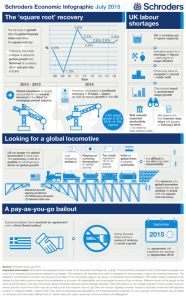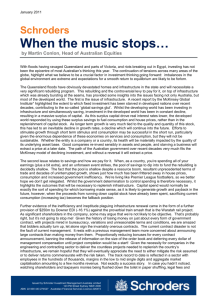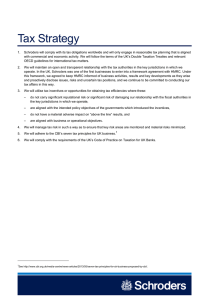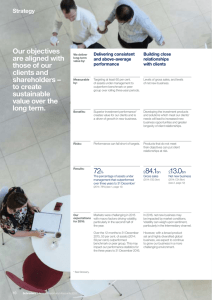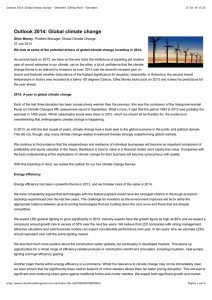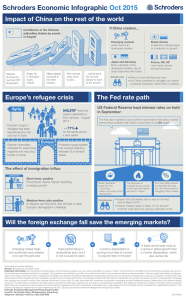Corporate Responsibility Report 2013 Schroders plc
advertisement
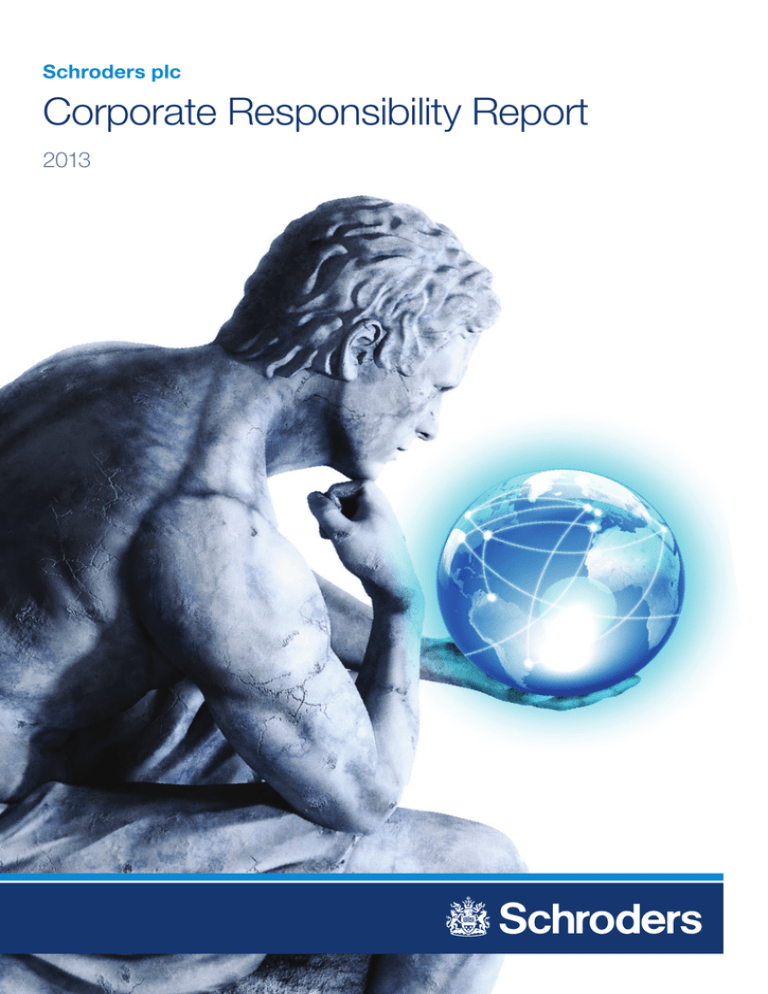
Schroders plc Corporate Responsibility Report 2013 Corporate Responsibility (CR) Report Contents Introduction 2 This report summarises our CR activities during 2013 Marketplace 4 Our stewardship responsibilities and ethical, social and governance investment People 8 Our dedication to being an employer of choice Environment 13 Minimising the effects of our business on the environment Community Giving back to the communities in which we operate 15 CR numbers at a glance CR MATTERS iii www.schroders.com/cr Introduction At Schroders, we have a long-term focus and have recognised the importance of sustainability for many years; not only where our clients are concerned, but also in respect of our employees, and the wider community. Integrity and appropriate conduct are integral to Schroders’ culture. From 2013 we have set ourselves further targets to reflect our continued investment in energy efficient measures. By 2017 we hope to reduce energy consumption by a further 10 per cent. from the 2012 benchmark and to reduce our greenhouse gas emissions by 10 per cent. over the same period. We are committed to acting in a responsible way and drive continuous improvement across the business through the identification and implementation of policies, schemes and behaviours to promote sustainability. We support the communities in which we operate and encourage employees globally to take a proactive approach to corporate responsibility by participating in community or environmental schemes, fundraising or volunteering. Our approach to charitable giving focuses on employee choice and, in many of our offices, employees are able to take up to 15 hours of paid leave per year, to offer their services to the charities which matter the most to them. Schroders remains a proud member of the Dow Jones Sustainability and the FTSE4Good indices, both of which identify companies that meet globally recognised corporate responsibility standards. As an asset manager, our long-term success is dependent upon us inspiring trust. We engage in ongoing dialogue and ensure that our communication is transparent. Through regular contact with key stakeholders, our employees, the local community, clients, charities, regulators and suppliers, we are able to understand better their expectations, and move forward together. Recognising that our operations have a direct effect on the environment, we set a five-year target in 2007 to reduce energy usage in our London head office by 15 per cent. By 2012 we were pleased to have exceeded this target, with our energy usage having reduced by almost 25 per cent. Over the same period we reduced our carbon output in London by just under 26 per cent. 2 We made charitable donations of £1 million in 2013, much of which was donated through matching of employee donations and sponsorship. In the UK, 25 per cent. of our employees made donations via payroll giving, in recognition of which Schroders once again received the Payroll Giving Quality Mark Platinum Award from the Charities Aid Foundation. Schroders continues to invest for the long term, in support of future growth. Ensuring we continue to operate in a sustainable way is a key part of our future plans, to nurture success and secure a long-term sustainable future. We strive to be socially responsible, focusing on our core values of integrity, passion, innovation, teamwork and excellence. CR at Schroders Corporate Responsibility (CR) is an integral part of Schroders’ culture and, in order to ensure it is embedded within our business and managed and dealt with at the appropriate level, Philip Mallinckrodt, an executive Director of the Schroders plc Board oversees this area. We have policies in place to ensure that Schroders behaves in a socially responsible way in its day-to-day activities and, as a major investor, we monitor the activities of the companies in which we invest and use our influence as a shareholder to encourage these businesses to act responsibly. We are committed to complying with our tax obligations worldwide and to maintaining a good reputation with tax authorities in the jurisdictions in which we operate. In the UK, Schroders was one of the first businesses to enter into a framework agreement with HMRC. Under this framework, we keep HMRC informed of our business activities, results and key developments as they arise and proactively disclose issues, risks and uncertain tax positions. We have also signed up to the Code of Practice on Taxation for Banks and comply with its requirements. During 2013, we engaged in dialogue with a number of external action groups to share details of our approach in this area. Tax Schroders is committed to conducting its tax affairs in an open and transparent way. In 2013, we paid corporate income taxes of £93.9 million (2012: £81.6 million). Our approach to CR is built around four pillars: Marketplace – Being transparent in our operations & reporting – Encouraging and supporting these principles in the companies in which we invest We are a member of the London Benchmarking Group (LBG). 3 People – Developing and retaining a deep pool of talent Environment – Minimising our environmental footprint We are included in the FTSE4Good Index Series. Community – Supporting the communities in which we operate We are a member of Heart of the City’s alumni programme. We participate in the Carbon Disclosure Project (CDP) climate change program. Marketplace In 2013 we further strengthened our approach to this area of CR by bringing together the Responsible Investment and Corporate Governance teams under the oversight of a Global Head of Stewardship and Environmental, Social and Governance (ESG) Investment. We believe that engaging with companies strategically is good for both returns and CR. Constructive engagement with corporates has been a long-standing theme in the US institutional investment market and is becoming increasingly important in the UK. Schroders is a member of the Collective Engagement Working Group, established in 2013 and supported by the Association of British Insurers, the Investment Management Association and the National Association of Pension Funds, to identify how investors can work together in their engagement with listed companies to improve sustainable, long-term company performance and overall returns. We support the creation of an Investor Forum in 2014, to operate Engagement Action Groups to address and resolve issues of concern when they arise at major UK listed companies. Corporate engagement is an integral part of our investment process. It allows us to understand the sustainable value of the companies in which we invest on behalf of our clients. During 2013, our fund managers and analysts attended over 14,500 meetings with companies to discuss issues such as strategy, management, governance and financial performance. We are also committed to the UK Stewardship Code, published by the Financial Reporting Council in 2012, and we state on our website how we comply with the code. www.schroders.com/ri 4 Our Environmental, Social and Governance Policy outlines our approach to engaging with companies in which we hold equity investments and our approach to conflicts of interest in that regard. We will engage and normally vote on any issue affecting the long-term sustainable value of a company in which we invest. Our focus is primarily on issues material to the value of a company’s shares. Schroders votes at the AGMs of companies, including resolutions on climate change issues. We have supported calls for increased Government commitment through the Institutional Investors Group on Climate Change (IIGCC) and the Prince of Wales Business Leaders Forum (PWBLF) Climate Change communiques as we recognise that we need this clarity on policy in order to make effective investment decisions. During the year, we also voted on the resolutions of 6,500 company meetings. We aim to vote at all company meetings where we have an equity holding and will vote on all resolutions except where there are onerous conditions attached to voting. Voting reports are provided quarterly to institutional clients and we also publish details of our voting record on our website. This is done after an appropriate period of time so that the publication of our voting record does not unduly influence the outcome of discussions with the company. We believe that effective engagement with management should normally remain confidential since publicity can frequently entrench positions rather than resolve issues. Ethical screening is also becoming an increasingly important area for our clients and assets under management with ethical screening have increased significantly in recent years to over nine per cent. of total AUM. We believe that companies have the ability to enhance their long-term performance through an understanding of the ESG issues affecting their business. In an increasingly dynamic environment where legitimacy and credibility in the marketplace are important indicators of corporate performance, a thorough awareness of these issues enables companies to potentially mitigate risks and liabilities which could arise, and to realise opportunities. We believe that our approach to responsible investment is in compliance with the UN Principles for Responsible Investment. This approach is set out in our responsible investment policies which can be viewed on our website at www.schroders.com/ri Group Ethical AUM 2009-2013 Ethical AUM (£bn) % of Group AUM 2013 25.3 10.0 2012 15.0 7.0 2011 11.3 6.1 2010 8.2 4.2 2009 3.9 2.6 Company resolutions voted on We have continued to see an increase in the value of assets under management to which some form of ethical restriction is applied. The increase of 69 per cent. year-on-year is far greater than the 22 per cent. in the MSCI world index during the same period, indicating an increase in client demand for ethically-managed portfolios. Typically, these funds have a simple exclusion applied to them in the form of excluding stocks deriving a percentage of revenue from, for example, tobacco or alcohol production. 5 Responsible investment in action: climate change The indirect impact of climate change on the companies in which we invest, and of those companies on climate change, varies by sector. However, we have a proactive responsible investment programme which addresses the risks and leverages the opportunities that climate change presents to these investments. In addition, the Schroders Global Climate Change Fund invests in companies that will benefit from efforts to mitigate and adapt to climate change. This fund also provides learning opportunities for our other investment products across the group. We believe that this focus on determining the impacts of climate change on the investment process provides us with a competitive advantage, and will positively impact client return. Our climate change strategy forms a key part of our day-to-day business operations and we invest time and resources to ensure the properties from which we operate, and the services that we provide, have the least possible environmental and climatic impact. In 2008, the Schroders plc Board approved a climate change statement which details our ambitions to monitor, manage and report our emissions and our efforts to reduce them, as well as how we integrate considerations of climate change into our business strategy and the services that we offer our clients. In the longer term, climate change presents both risks and opportunities to the companies in which we invest and therefore to the performance of our business, and we have developed various solutions for integrating these considerations into the investment process on an iterative basis. Long-term investment focus As part of our investment process, we have a responsibility to take into account the ESG performance of the assets in which we invest, and we endeavour to be responsible investors when exercising our duties to clients. This means we have policies in place to ensure we take into account the long-term climate change risks and opportunities that may affect the resilience of the assets in which we invest. In 2010, we expanded our Responsible Investment Policy to include a global focus and in 2011 we adopted a similar policy for the Fixed Income business. As such, the majority of Schroders’ product ranges available to clients 6 are covered by responsible investment policies. As global ESG disclosure and standardisation improves, we expect to see an increase in the understanding of how key performance indicators influence business performance to improve and, subsequently, how the analysis of ESG data can be integrated into the stock selection and valuation process as well as the engagement process. Central to responsible investment is our belief that it is in our clients’ best interest to consider a company’s management of, and exposure to, ESG issues. Companies that combine good governance and CR will tend to deliver shareholder value over the long term. Rick Stathers, Head of Responsible Investment What does Responsible Investment (RI) mean to Schroders? At Schroders, RI covers three broad areas: 1. Taking account of environmental, social and governance (ESG) factors in our stock valuation and selection process; 2. Using our position, as an active investor, to exercise our voting rights and engage with company management on ESG issues to enhance shareholder value on behalf of our clients; and 3. Developing exclusion screens to meet our clients’ moral investment objectives How much of an influence can we, as shareholders, have in the decisions made by other firms? What is the benefit to Schroders of having a dedicated RI team? We’ve had ESG expertise for more than a decade, which is a real strength and demonstrates to clients and consultants This predominantly depends on the amount of Schroders’ commitment to this area. This is key, stock we hold in a given company. However, as external research has shown that around we are well aware that there are many other 70 per cent. of requests for proposals currently stakeholders that will influence management include questions about our ESG experience, decisions (eg consumers, regulators, the capabilities and performance. Additionally, as environment, peers, employees). we are seeing more interest coming from our global business, not just “We’ve had ESG expertise for more than a decade, from Europe, having an internal centre of expertise is very useful, whether which is a real strength and demonstrates to clients responding to client queries or and consultants Schroders’ commitment to this area.” questions from the investment teams. I like to think that because we actively discuss ESG issues with companies, this demonstrates that we, as long-term asset managers, recognise the importance of non-financial performance to the long-term sustainability of a company, and that this, in itself, acts as a catalyst for further improvement. 7 How do we compare to other asset managers in this space? In recent years, a lot of effort has been invested in integrating ESG into the equity analysts’ research process. This approach has seen us achieve excellent ESG product and Group ratings from external consultants, and I was pleased to hear from one product manager that we are regarded as ESG integration leaders by some industry bodies in the U S. People Identifying, retaining and developing a deep pool of talent is one of our key strategic goals. We recognise that good communication is important to ensure that employees are engaged and committed to Schroders and our strategic goals. We communicate regularly through a variety of channels, including management briefings, an in-house magazine and TV channel, and online news articles. Annual employee meetings are also held to facilitate the exchange of views with senior management and discussion of the progress made by the Group. In the UK, an Employee Forum provides an additional channel to represent employee views to management. Competitive remuneration is one of the keys to achieving this goal and our approach to remuneration is explained in the Remuneration report of our 2013 Annual Report. High ethical standards We promote high ethical standards and have an internal whistleblowing policy, whereby employees can raise concerns about behaviour or decisions that could indicate potential wrongdoing. Personal securities trading by employees is subject to clearly defined internal policies. Employees are not permitted to solicit or accept any inducements that are likely to conflict with their duties. Training is provided in relation to antibribery, anti-money laundering, terrorist finance, data protection and treating customers fairly. 8 Equal opportunities We are committed to providing equal opportunities in employment and avoiding unlawful discrimination. We expect our workforce to reflect the diversity of the many communities in which we operate. Where possible, we monitor the ethnic, age and gender composition of our existing workforce and those applying for jobs. Our policy is to give fair consideration to all applications for employment, having regard to particular aptitudes and abilities. The Group gives full and fair consideration to applications for employment from disabled persons. If employees become disabled, employment continues wherever possible, with retraining given if necessary. For the purpose of training, career development and progression, all employees are treated equally. The Group is committed to creating a work environment free of harassment and bullying, where everyone is treated with dignity and respect. A policy is in place to assist in treating everyone fairly, regardless of their age, gender, race, sexual orientation, disability, religion or beliefs. The effectiveness of this policy is monitored periodically. Gender diversity within the Group 2013 Directors Senior managers Subsidiary managers Total senior management All employees Female Male 1 10 138 426 11 52 149 478 1,487 2,041 42% 58% Managing diversity Personal development We believe that appointments to roles should be based on merit and performance. We do not support quotas but recognise that we must have a proactive and coordinated approach to attracting, retaining and developing a diverse workforce. The Group operates a performance management model which encourages all of our employees to continually develop and progress. The heart of our model is an annual appraisal, where performance is measured against agreed objectives to inform decisions on remuneration, career development and future progression. Schroders is already diverse in terms of the nationalities employed in our local offices across the world. This is a key strength that provides us with local market knowledge and a deep understanding of our clients’ needs. Our gender diversity within the Group can be seen in the table on the left. Human rights We comply fully with appropriate human rights legislation in the countries in which we operate. Our business is undertaken predominantly in countries that have strong legislation in this area. We also encourage our business partners to adopt the same standards. 9 Learning and Development We are committed to maintaining a highperforming organisation, and recognise the importance of encouraging all employees to learn and develop to reach their potential full potential. We are dedicated to providing our employees with the opportunities and experiences they need to achieve their potential and grow their knowledge, skills and capabilities. We provide products and services to support our employees in identifying their development needs and determining action plans to meet them. Employees are encouraged to take responsibility for their own development, working with their manager to create a personal development plan that supports the achievement of the business objectives as well as their individual aspirations. An internal learning schedule is available to employees via the intranet, offering a wide range of learning opportunities. Schroders offers a comprehensive library of online courses including financial markets, management and regulation topics. Access to the online library is provided via the internet, allowing content to be viewed globally and from home. 10 Through our Professional Qualifications Policy, we encourage all employees to complete professional qualifications relevant to their role. In recognition of the employee investment in achieving such qualifications, we offer competitive educational assistance, which includes provision of financial support and study leave. To ensure we develop our employees’ management skills, we have comprehensive training support for all levels of management. The two-year Fundamentals of Management Programme is designed for employees who are new to a management role, and has core and optional modules covering a variety of people management topics. The Business Management Programme serves as a natural progression from the Fundamentals of Management Programme and has a broader management focus. Health and safety The health and welfare of our employees are very important to us. We promote high standards of health and safety at work and have a global Health and Safety Policy, implementing UK standards, which we expect all offices to adhere to unless their local legislation requires higher standards. Senior management in each location is responsible for the implementation of the policy. This highlights our commitment to ensuring employees are provided with a safe and healthy working environment. A comprehensive risk assessment programme is in place in the UK, ensuring that all employee activities, and any works carried out by subcontractors, are identified and controlled to prevent accidents occuring. In the UK, we operate an integrated healthcare approach with our private medical health provider and occupational health clinics working together to ensure the wellbeing of our employees. We offer health and vision screening, free of charge, as well as access to medical consultations at short notice. Gym facilities are provided at our Head Office in London to encourage employees to enjoy a healthier lifestyle. Similar healthcare arrangements are offered in many of our international offices. 11 In our London offices, a Sports and Social Committee organises events throughout the year, open to all employees. There are a number of sports teams, including football and netball, as well as social events, such as photography and cookery classes, theatre trips and team quiz events. We recognise that workplace stress is a particularly important health and safety issue and are committed to identifying and reducing it. We offer workplace counselling and occupational health doctors to provide specialist advice on stress management. We appreciate that individuals may, at different time in their lives, have various sensitive issues with which they may need help. In order to pprovide support where we can, we offer a confidential counselling helpline in the UK. This provides employees and their dependants with access to a 24-hour, confidential counselling helpline service covering a variety of issues including stress, marital, legal and financerelated problems. This service is strictly private and confidential and there is no individual case feedback to Schroders. Keshma Shah, Content Strategy Manager As well as having the opportunity to further their learning and development, our employees are encouraged to influence their own role and career trajectory. Keshma joined Schroders three and a half years ago as an Investment Communications Specialist, having been attracted to Schroders because ‘it’s a successful company with a great reputation’. She sees her key attributes as being ‘flexible and adaptable’, and is putting these to good use as she has recently taken on a newly-created role as Content Strategy Manager, which is a strategic role within the Marketing function. She is particularly enjoying the challenge of this new role as she helped to shape it, an opportunity which she describes as being ‘rare and very exciting’. Her advice for others is that ‘you need to be able to spot opportunities and shape your career around these developments’. On a day-to-day basis, the biggest challenge Keshma faces is ‘finding the time to fit in all the things I have to do!’ These include devising Marketing’s future strategy around content creation, management, distribution and measurement; ensuring content initiatives support marketing goals; and editing the TalkingPoint website, Schroders’ one-stop shop for all news and views from in-house economists, investors and external experts. Her favourite thing about working at Schroders is ‘the people; there are some genuinely nice people here and I’ve made some good friends. I also like working in the City – it has a different atmosphere to anywhere else in London.’ When asked about her future at Schroders, Keshma says: ‘I keep being challenged and given opportunities to grow in areas that interest me.’ Of the culture at Schroders, Keshma says: ‘Importance is placed on maintaining a good work/life balance, but at the same time everyone is motivated to work hard. People definitely have a can-do attitude and there’s also a healthy level of ambition where people want to achieve success for the business but also personally.’ To succeed at Schroders, she thinks ‘you have to be driven and want to drive the business forward, have ideas and not be afraid to voice them, but also see those ideas through to completion.’ “I really like how working at Schroders constantly challenges me and provides opportunities to grow.” 12 Environment We are committed to minimising the environmental impacts of our operations and to delivering continuous improvement in our environmental performance. In 2013, we used DEFRA’s conversion factors to calculate our CO2e emissions for all office locations. In 2012, we used DEFRA’s conversion factors for UK reporting, and either local conversion factors or guidelines from the UN for all other office locations. The total CO2e emissions data disclosed is consistent with our Carbon Disclosure Project submission which will be externally verified during 2014. Our total carbon output has decreased by 11 per cent, which reflects our continued investment in energy efficiency measures. Building on this, we have set ourselves further targets from 2013 and we hope to reduce energy consumption in the London office by a further 10 per cent. by the end of 2017, and to reduce greenhouse gas emissions by 10 per cent. over the same period. Climate change Our business has both direct and indirect impacts on climate change; directly through our operations, and indirectly through our investment activities. While our direct operations may have a modest climate change impact, we proactively address our emissions related to energy use, travel and waste. Schroders continues to run a number of initiatives to encourage consideration and action by all employees of environmental issues in both the 13 business and home environments, especially those related to either corporate or individual impact on climate change. Throughout 2013, talks and events were organised to provide educational advice to employees on how they can contribute to environmental efficiency and climate change efforts. We continued to promote our ‘Green Points’ initiative, to encourange employees to recycle more and different items, reducing waste sent to landfill and helping a number of charities. ‘Green Points’ is an internal competition where points are earned relative to the amount and type of recylcable material collected, and the winning area within the business is able to choose a charity to receive a donation of up to £1,000. Supporting climate change initiatives Schroders was a founding member of the Institutional Investors Group on Climate Change which was established to raise awareness about the risks and opportunities climate change presents to the investment community. We are also a supporter of, and special adviser to, the Carbon Disclosure Project (CDP), the Water Disclosure Project (WDP) and Forest Footprint Disclosure Project (FFDP). Total CO2e emissions 2012 2013 9,353 7,656 tonnes CO2e emissions per employee tonnes 7,273 16,626 2012 5.5 14,681 2013 4.2 7,025 Combustion of fuel and operation of facilities (gas, oil, all travel) Electricity, heat, steam and cooling purchased for own use (electricity only) Waste management (London only) Procurement In 2013 we reduced the amount of waste we produce per employee by 19 per cent., with none of our waste being sent to landfill. Of this waste 79 per cent. was recycled, an increase of six per cent. compared to 2012, with the remainder sent to an incineration plant and used to generate electricity. Our aim is to continue to increase the percentage of waste we recycle, and in 2014 we will introduce greater measures to segregate our waste throughout the London estate. Food waste will be collected separately and sent to an anaerobic digestive plant where it will be converted into biogas. Procurement of environmentally-friendly goods forms an increasingly large element of our environmental management programme. When selecting suppliers, their approach to corporate responsibility forms a key part of the process, and we continue to adopt a policy of active engagement with our key suppliers to minimise the environmental impact arising from their operations, both on and off-site. Water usage (London only) We continue to commit to the efficient use of water and encourage our employees to conserve water, both in the office and at home. In 2013, our consumption of water in London decreased by 12 per cent. per employee. We will continue to review and build on our water reduction measures where possible. Information Technology (IT) (London only) in 2013 we continued to work with our outsourced computer services provider, Computacenter, to ensure a resilient IT Environmental Policy. This included monitoring the waste outputs of all IT processes and investigating techniques to reduce waste streams whenever possible. We ensure our IT hardware is refurbished and reused at the end of its normal life cycle, and all computers in the UK have their disk drives wiped clean before being processed for refurbishment or reuse by a specialist IT equipment recycler. All network equipment and other hardware is also disposed of in an ecologically friendly way. Since the European Parliament directive on waste electronic equipment was incorporated into English law some years ago, the emphasis on the disposal of IT and communications equipment in a safe and efficient method has become a determining factor within the tendering process. 14 In our London offices, the NightWatchman software programme continues to place PCs into standby mode after 10pm each evening, thereby reducing power consumption and CO2e emissions. We estimate that this results in savings of around £30,000 and 120 tonnes of CO2e each year. Paper usage (London only) We work closely with our outsourced reprographics provider, Williams Lea, to monitor and improve the impact its services have on the environment. We use Forest Stewardship Council approved paper produced in an ISO14001 accredited mill, with the option to use 100 per cent. recycled paper on specific print projects. To aid the reduction in paper usage, document scanning is enabled on photocopiers, and we encourage employees to only print documents where necessary. The default setting for all desktop printers has been set to doublesided printing where possible. Additionally, the central reprographics team now produces approximately 48 per cent. of work in the smaller A5 paper size, as well as encouraging dual image per page printing. We continue to review how to reduce paper consumption, and towards the end of 2013 we reduced the number of desktop printers and introduced new multi-function devices with a secure printing function to enable users to select specific images they wish to print. Travel Many employees in London travel to work by public transport. We encourage employees to cycle to work by providing secure cycle racks, showers and changing facilities. During 2013 we increased the number of cycle racks available to employees. Community We support the communities in which we operate and encourage our employees to do the same. In 2013, we donated £1.0 million (2012: £1.2 million) to charitable causes around the world, which included discretionary donations of £300,000 to charities involved with social welfare. Our approach to charitable giving focuses on employee choice, and we support and encourage employees to raise money for the charities that matter most to them. These fundraising efforts are matched by Schroders up to £2,400 per employee, per year. We also operate payroll-giving schemes in a number of our offices. In the UK, 25 per cent. (2012: 25 per cent.) of employees donated in this way in 2013, and the firm made charitable matching donations of £311,000 (2012: £280,000) to support these. We once again received the 15 Payroll Giving Quality Mark Platinum Award from the Charities Aid Foundation in recognition of this achievement. In keeping with our focus on employee community involvement, employees in many of our offices are encouraged to take up to 15 hours of paid leave each year to volunteer their time to work with a charity of their choice. If the volunteering they wish to do takes place outside working hours, our employees can claim ‘volunteer time matching’ to secure a donation for the charity they work with. More information including stories, case studies and videos on our charitable activities can be found on our website www.schroders.com/cr. Global volunteering Supporting community initiatives ELBA EaGLES In 2013 we began participating in an East London Business Alliance (ELBA) initiative, ELBA Graduate Local Employment Scheme (EaGLES), which aims to address the high level of unemployment and underemployment in East London. Following a thorough selection process, successful candidates undergo three weeks of intensive training at ELBA to help equip them for a six-month paid placement at a company located in Canary Wharf or the City of London. The scheme is an opportunity for participating companies, such as Schroders, to add value to their CR programmes and local recruitment strategies by employing a trainee with sound knowledge of the charity and community needs in East London. During the scheme, graduates are supported in enhancing their employability by learning new skills and being exposed to a wealth of knowledge and experience in their placement companies. This experience results in the graduates becoming highly employable, with 96% of the 75 graduates who have successfully completed the scheme going on to find full-time, permanent employment. Abigail Hall - Abi joined Schroders through the EaGLES scheme in February 2013 and, having completed her placement, has secured a permanent position at Schroders. Abi said: “Being at Schroders helped me to gain a lot more confidence and I’m so thankful because it gave me the drive and ambition to get to where I am now.” Nils Downes - Nils joined Schroders in September 2013 as the company’s second trainee hired from the EaGLES scheme. “I’m delighted to have the opportunity to gain experience of working in such a prestigious and well respected company like Schroders,” he said. “It will stand me in good stead for whatever career I decide to pursue in the future.” Case Studies Cocktails in Care Homes Magic Breakfast Scheme Read Alliance, New York The Cocktails in Care Homes programme run by the charity MagicMe, arranges for volunteers to visit local care homes and interact with residents, which stimulates communication and offers valuable social interaction. The Magic Breakfast Scheme, run by the Mayor’s Fund for London, places employees in primary schools with over 40 per cent. free school meal rates. Volunteers visit before work and play educational numeracy games with the children, while they enjoy a free, healthy breakfast. For the past five years, Schroders in New York has supported Read Alliance which employs teenage tutors to assist with improving the educational skills of kindergarten and first grade students in the Bronx through one-to-one tutoring in foundation reading skills. We have received excellent feedback from our volunteers, such as: “Visiting the school has become a highlight for me, and playing numeracy games with the children while they get their nourishing breakfast is a perfect way to take advantage of Schroders’ generous volunteering policy.” Schroders ‘adopted’ PS5X school in the Bronx, and employees support teenage tutors and students by volunteering as in-class tutors and assisting with homework. “We have been working with Schroders since October 2012 and so far have had 22 people sign up to our weekly cocktail parties,” said Programme Director Clea House. “Every week we have many interesting people from Schroders attending our parties to help us tackle isolation amongst elderly people in care.” 16 Global volunteering Three adventurous employees completed the 2013 Scotland Coast to Coast, one of the UK’s toughest endurance challenges, raising money for Children with Cancer UK. A brave employee from London tackled the Tough Guy Challenge – considered to be the toughest race in the world – to raise money for Great Ormond Street Hospital, which provides world-class care for its young patients and their families. The London Office took part in Red Nose Day to raise money for the charity Comic Relief. Across the office, employees took part in a home clothes day, bake sales, a 5k fun run and many other activities. All funds raised went towards transforming lives across the UK and Africa. Volunteers gave up their time to brave the cold and sell poppies at London Underground Stations as part of the annual Poppy Appeal, to raise funds for the Royal British Legion. A London employee completed a gruelling cross-Channel swim to raise money for the Royal Marsden Cancer Charity. SCOTLAND LONDON USA MOROCCO Working in the Bronx in New York, Schroders has adopted a school with Read Alliance. You can read more about this on page 17. The highest peak in North Africa, Jebel Toukbal in Morocco, was conquered by an employee from London, who along with 14 others made the ascent in just six days, raising money for two charities, Education for All and Tourism Concern. 17 The gruelling 100km MacLehose Trail through the mountainous Hong Kong countryside was no match for four brave adventurers from the Singapore office, who raised money for Oxfam. Employees from the Zurich office, along with their families, entered a sponsored run to raise money for the Theodora Foundation, a charity which sends clowns into hospitals where they bring laughter to sick children. Eight employees from the Hong Kong office took part in the Standard Chartered Marathon, raising funds for Operation Smile, which provides reconstructive surgery for children born with cleft palates and other facial deformities. SWITZERLAND The Singapore Charity Club recruited over 40 employees, along with friends and family, to clean and refresh the homes of the elderly. Volunteers battled cockroaches and rats, and managed to clean 15 homes, improving living conditions for residents in the process. HONG KONG SINGAPORE The Great Adventure Challenge was tackled by ten employees from Sydney. They took on the demanding team-based corporate adventure race, and raised funds for the Starlight Children’s Foundation, which aims to brighten the lives of seriously ill children and their families. SOUTH AFRICA AUSTRALIA An employee from London took part in the Cape Argus Cycle Tour in South Africa to raise money for the charity Zisize, which supports orphaned children who have been left as the head of their families in Kwazulu Natal in South Africa. 18 A keen cyclist from the Australian office took on the Chain Reaction Cycle Challenge, a 1,100km cycle over the course of seven days. Beginning in Melbourne and ending in Sydney, she raised funds for a number of children’s charities, including the Victor Chang Cardiac Research Institute. For more information, visit our website www.schroders.com/cr If you have any comments on our CR activities please contact cr@schroders.com
